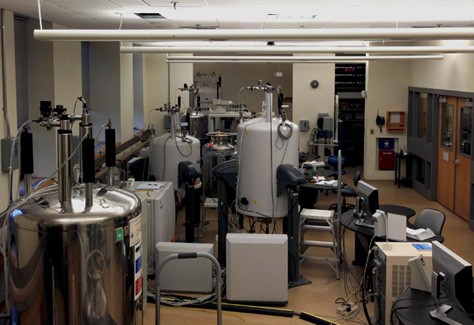Formed in 1954, The ISR is the largest sponsored research center at Boston College. It embodies the university's motto "Ever to Excel." It has been and continues to be at the forefront of world-class innovative research.
Our highly skilled team of scientists, engineers, mathematicians, and research associates uses its expertise for theoretical and experimental studies that include space physics, space chemistry, solar-terrestrial research, space weather, and astrophysical studies.
Our current projects include heavenly explorations—for example, observing the celestial sky to interpret the changes in infrared emissions in space—and earthbound pursuits, such as defining the effects of solar storms on space-based communication and navigation systems.
Our researchers are fully dedicated to their work and have achieved numerous awards and high acclaim from our sponsors. These sponsors include:
- the Air Force Research Laboratory (AFRL),
- the Air Force Office of Scientific Research (AFOSR),
- the National Aeronautics and Space Administration (NASA),
- the Office of Naval Research (ONR),
- the National Science Foundation (NSF),
- the Federal Aviation Administration (FAA),
- and other sponsors and partners from industry and academia.
As an organized research institute at Boston College, ISR supports the research mission of Boston College to conduct national and international significant research that advances insight and understanding, enriches culture, and addresses pressing social needs. Through our research and workshops, ISR also fosters the intellectual development of young scientists from around the world.

To conduct ethical and innovative research in both experimental and theoretical aspects of space physics, the solar-terrestrial environment and space weather
To seek sponsored funding for basic and applied research with thoughtful and well-defined proposals
To provide high-quality and timely publications of our research results
To act in accordance with contract and grant regulations
To maintain timely reports and budgetary control of sponsored funds
To encourage interested and qualified students to become involved in our research projects
To contribute to the education of future scientists around the world
To challenge our staff by promoting ground-breaking ideas
To take an active role in the Boston College Research Council
To represent Boston College as a world leader in scientific research

The Institute for Scientific Research was established in 1954, when Professor Rene Marcou of the Mathematics Department was awarded a $5000 contract from the Air Force to map the ionosphere and its effect on radio waves. This funding was the first government-sponsored research grant for Boston College.
The grant was used to define algorithms to study some of the very first ionospheric measurements made by some of the early rocket sensors. In the years that followed, more research grants were made to this department to continue Professor Marcou's early work. Much of this was fueled by America's race to catch up with the Russians in space research. In fact, the institute was involved in analyzing some of the earliest satellite measurements from Sputnik and the US Explorer satellites that followed Sputnik.
Over the years, the Institute had several name changes to reflect the ever changing nature of our studies. From Ionospheric Research to Space Data Analysis and then, since we did more than just analyze data, the name was changed to the Institute for Space Research. Then, to include our studies that exceeded the realm of space, we became the Institute for Scientific Research.
Historically, the Institute's programs have helped put space shuttles in orbit, made significant contributions in studies of space weather phenomena, and supported America's defense systems. More recent projects address current interests in space exploration, mitigating the effects of space weather, and social justice with international partnerships that address building capacity for scientific research in underdeveloped countries.
Today the Institute, with nearly 60 staff members, continues to evolve as a nationally and internationally recognized research institution dedicated to space- and earth-based scientific exploration.

